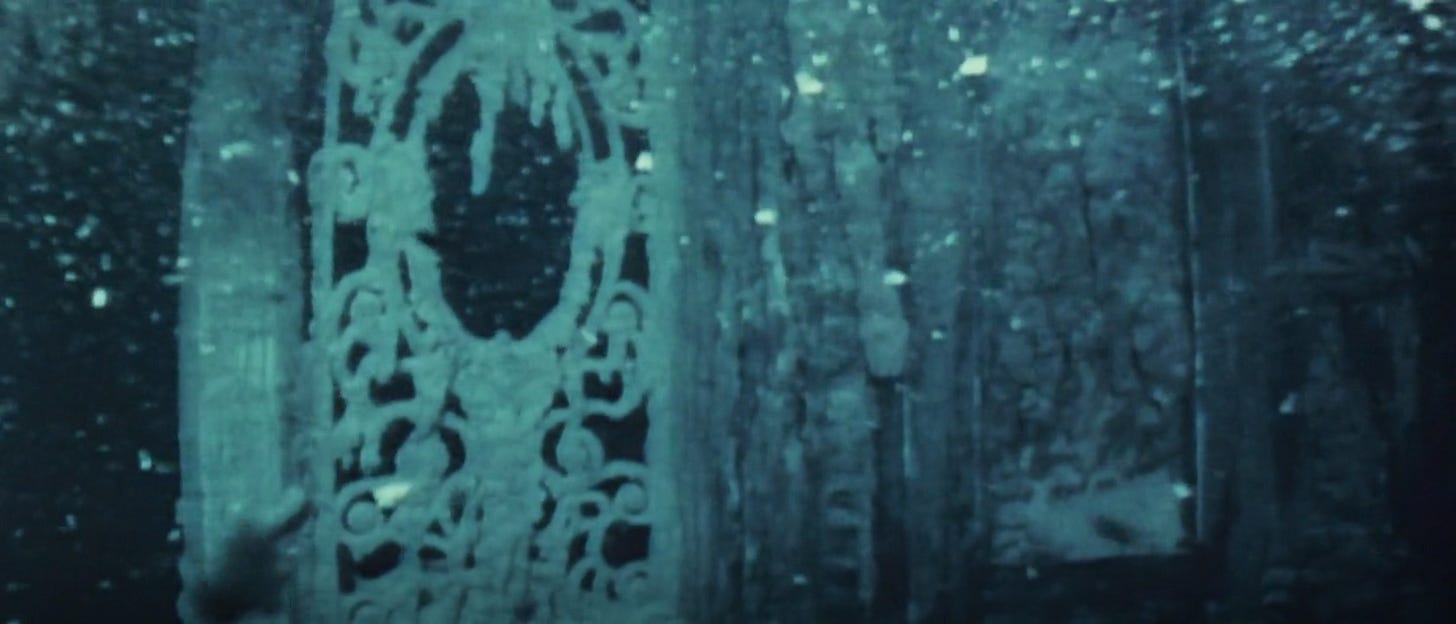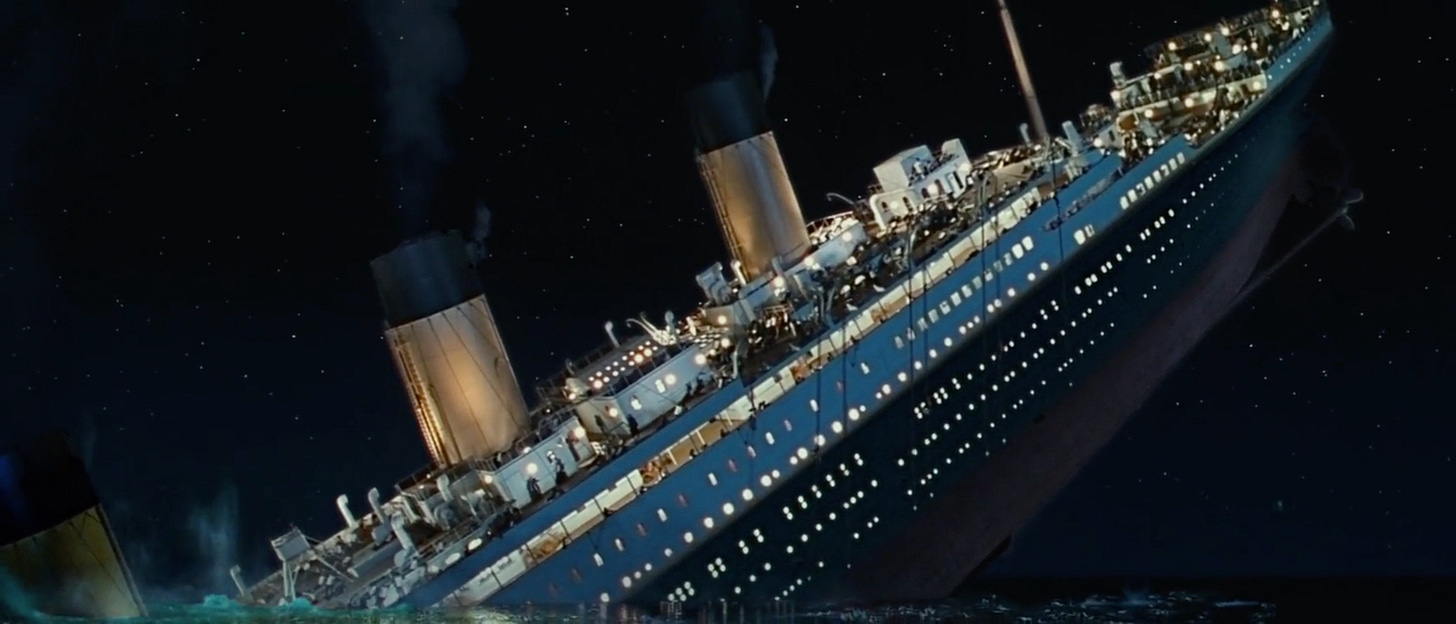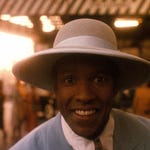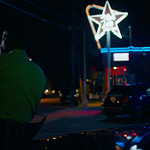Fellow passengers,
James Cameron’s films have a lot going on, but they are not thematically complex. Yet, there is something to the drawn-out ruination of his grandest vision, the three-hour Titanic (1997), that transcends his rollicking blockbuster style and its classical roots. As we observe (if hardly originally) on our latest podcast, the film is smartly cleaved into two halves, the former of which serving to intensify the latter. But, despite the way this highlights the narrative’s obvious point-of-no-return moment—the titular ship’s fateful iceberg collision—Cameron actually seems to stretch and weave his story’s various revelations across the whole run-time.
During the film’s first half, Cameron tells two stories in parallel: primarily, that of Rose DeWitt Bukater (Kate Winslet), the betrothed New York aristocrat who begins to chafe against her social surroundings; and meanwhile, the dubious choices made by the Titanic’s men in charge that would lead, swiftly, to her sinking in the Atlantic ocean. Each narrative is presented with, frankly, the subtlety of a collapsing smokestack, but they do each rest on an involving sense of accumulation, as multiple major turns are made until everything, eventually, coalesces into the sustained chaos of the second half. Of course, Rose’s discoveries and decisions throughout are directed towards her ultimate survival and, more to the point, her thriving via the quasi-bohemian lessons learnt from her itinerant lover, Jack (Leonardo DiCaprio). The decisions made by ship captain Edward Smith (Bernard Hill) and managing director J Bruce Ismay (Jonathan Hyde), on the other hand, those that led to the deaths of over 1500 people, are each irreversible parts of the historical puzzle that Cameron, as both a storyteller and a literal deep-sea researcher, is attempting to reconstruct.
This epic-novel structure, balancing the personal/fictive against the universal/historical, using one to reflect the other, immediately makes the film of a piece with a particular strand of Hollywood’s prestige products over the decades. It also sets the pace for Cameron’s particular approach to history: one inextricable from his showmanship, which takes form not just in technical spectacle but in the film’s constant stream of rhetorical flourishes. The tale-as-old-as-time tragic love story becomes a clotheshorse for all manner of ostentatious metaphors, all of which build a vision of the Titanic and its fate as a critical nexus for class, capitalism, Empire, misogyny, etc. etc. The film’s action-packed second half responds to several of the propositions of its rather more polite first half while taking the narrational reins from the Rose character—whose specific, personal reminiscences are our entry point to the aristocrat class—and passing them to the unseen director for his omniscient tour de force.
In other words, Cameron uses his clear genre shift to delineate also his two theories of storytelling. As discussed on the podcast, he puts great effort into highlighting the importance of a personal oral narrative, while self-reflexively “justifying” this within a mode—the flash-bang stuff, essentially—that seems to say, at every turn, “See? You can’t look away!” Riffs on this split are also present in Terminator 2: Judgment Day (1991), True Lies (1994) and his co-authored screenplay for Kathryn Bigelow’s Strange Days (1995), all of which vary their modes of narration within the very specific context of thinking through the end of the world. Titanic’s particular, terrifying depiction of apocalypse in microcosm may bear a tonne of problematic baggage with its attempts at reconciling its various ideas and approaches, but the basic proposition with its converging thematic and narrative strands is an essential part of its overall effect.
But, again: that big, mid-film shift is just the clearest, not the sole, mark of its balancing of modes. The oft maximalist treatment of this event, characterised by a conveyor belt of punchy, digestible scenes, allows for Cameron’s ideas to spread leisurely across the three hours. It creates a sense of illustrative rather than sequential plotting, despite being so defined by its obvious forward momentum. Think of the time and effort put into scenes such as Rose’s breakfast with Cal (Billy Zane), or Rose and Jack’s spitting over the side of the ship—or, more famously, of incidental details like the string quartet playing, giving up, then playing again for good. This is long filmmaking as grand over-stuffing, and it’s precisely that over-stuffing that makes this gaudy, middlebrow magnum opus so genuinely devastating. However questionable the aesthetics and ethics of Cameron’s presentation of a nasty historical tragedy, he sure makes you feel its full weight.
As ever: thanks for listening.
—Calum & Eddie
















Share this post